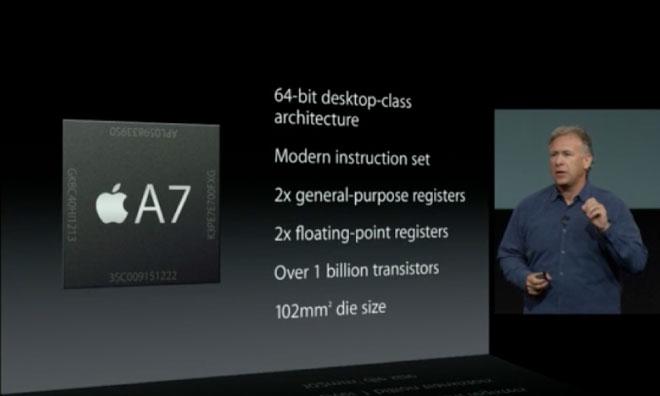Apple caught market-leading chipmakers off guard when it debuted the 64-bit A7 system-on-chip alongside the iPhone 5s in September, a move one Qualcomm insider says put the industry in panic mode.
In a report from Dan Lyons' blog HubSpot, an unnamed source at chipmaking giant Qualcomm said Apple's A7 "hit us in the gut," referring to the silicon's support for 64-bit processing.
"Not just us, but everyone, really," the person said of the surprise Apple's chip caused. "We were slack-jawed, and stunned, and unprepared. It's not that big a performance difference right now, since most current software won't benefit. But in Spinal Tap terms it's like, 32 more, and now everyone wants it."
Apple's A7 SoC holds the distinction of being the first 64-bit application processor to be used in a smartphone. Up until the iPhone 5s was unveiled, companies didn't see the need to include such an advanced processor in a handheld mobile device as apps were not able to take advantage of the extra horsepower. Even now, only a few programs outside of Apple's own stable are capable of addressing the technology.
"The roadmap for 64-bit was nowhere close to Apple's, since no one thought it was that essential" - unnamed Qualcomm insider.
"The roadmap for 64-bit was nowhere close to Apple's, since no one thought it was that essential," the source said. "The evolution was going to be steady. Sure, it's neat, it's the future, but it's not really essential for conditions now."
Apple managed to keep the A7 a secret until the iPhone's unveiling in September, quite an achievement considering the abundance of parts leaks leading up to the event.
At the time of the A7's release, Qualcomm's former chief marketing officer Anand Chandrasekher pooh-poohed the prospect of a 64-bit smartphone chip, saying of Apple, "I think they are doing a marketing gimmick. There's zero benefit a consumer gets from that."
Less than a week later, Qualcomm clarified its stance on the issue and called Chandrasekher's comments "inaccurate." The ex-CMO was ultimately removed from his post and reassigned.
With the mass-produced 64-bit A7 AP in the wild, powering the iPhone 5s, iPad Air and iPad mini with Retina display, the insider views Apple as being at least one year ahead of the competition, maybe more. Despite having the tech on a roadmap, chipmakers can't turn on a dime and moving their prospective timelines forward on such short notice will be challenging.
For example, Samsung, the foundries of which Apple uses to manufacture the A7, announced in November that it will be offering its own 64-bit Exynos chips sometime in the future. The Korean giant was mum on tentative release date, however.
"Apple kicked everybody in the balls with this," the Qualcomm employee said. "It's being downplayed, but it set off panic in the industry."
 Mikey Campbell
Mikey Campbell







-m.jpg)






 Charles Martin
Charles Martin
 Christine McKee
Christine McKee
 Wesley Hilliard
Wesley Hilliard
 Malcolm Owen
Malcolm Owen
 Andrew Orr
Andrew Orr
 William Gallagher
William Gallagher
 Sponsored Content
Sponsored Content







145 Comments
Yeah baby! Who's yo daddy now?! ;)
The "set off panic" article title was circumspect, given the availability of the "in the balls" reference they could have used in the title...
When I read this story earlier and MacRumors it made me smile as I remembered all the analysts and tech bloggers claiming that Apple could not innovate. Many downplayed the 64-bit microprocessor achievement that Apple had made. Nearly 3 months later the real news starts to trickle out about Apple's competitors panicking over the release of the 64-bit a seven chip. Everyone was caught by surprise. Now everyone wants one. Everyone is going 64-bit. I am glad Apple got there first! I am looking forward to reading the glowing reports of Apple's competitors' 64-bit processors when they come out in 2014 and 15. I have no doubt the analysts and bloggers will say Apple is falling behind and Apple cannot innovate.
Once Apple has Xcode running on Ax64 iOS, you'll really see the industry freak out. An iPad pro with the ability to connect multiple large screen displays is going to give a lot of people heartburn for sure. Originally, you could only program a Mac using the Lisa. Then you needed the 68040 to create software for MacOS PPC. Later, PowerPC was required to write code for Intel OSX. Today, you need an Intel Mac to program the iPad. Tomorrow, you probably won't [B]even use [/B]Xcode on a Mac.
Yup. Panic indeed http://www.engadget.com/2012/10/29amd-64-bit-arm-opteron-server-cpus/ http://mashable.com/2012/10/30/arm-64-bit-processors/